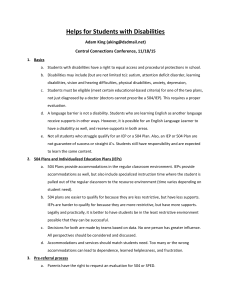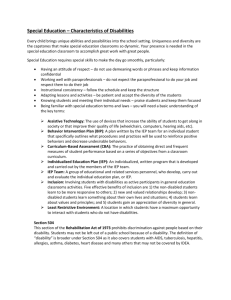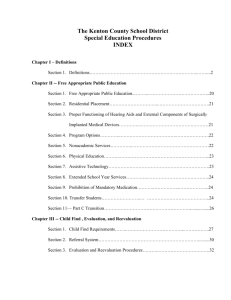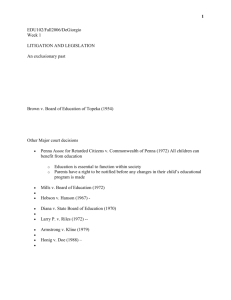Parental Rights in Special Education & under Section 504
advertisement
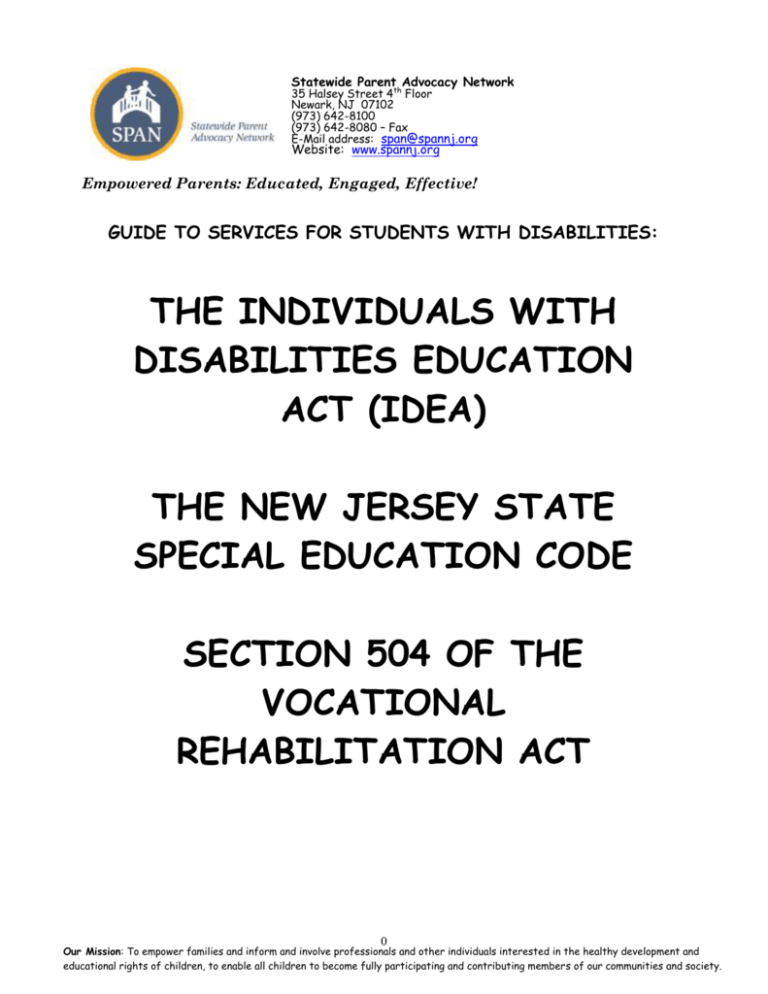
Statewide Parent Advocacy Network 35 Halsey Street 4th Floor Newark, NJ 07102 (973) 642-8100 (973) 642-8080 – Fax E-Mail address: span@spannj.org Website: www.spannj.org Empowered Parents: Educated, Engaged, Effective! GUIDE TO SERVICES FOR STUDENTS WITH DISABILITIES: THE INDIVIDUALS WITH DISABILITIES EDUCATION ACT (IDEA) THE NEW JERSEY STATE SPECIAL EDUCATION CODE SECTION 504 OF THE VOCATIONAL REHABILITATION ACT 0 Our Mission: To empower families and inform and involve professionals and other individuals interested in the healthy development and educational rights of children, to enable all children to become fully participating and contributing members of our communities and society. INTRODUCTORY COMMENTS Section 504 predates IDEA, and is the first federal legislation to prohibit discrimination based on disability. It has broader coverage than simply education, prohibiting discrimination in employment and public accommodations (such as child care, before and after-school care, municipal recreation programs, etc.) as well. Prior to 1997, IDEA did not prohibit discrimination against students with disabilities, although it required the provision of a “free, appropriate public education.” With the 1997 reauthorization of IDEA, some non-discrimination provisions that had only been in Section 504 (participation in extracurricular and nonacademic activities, such as after-school programs, intramural sports, etc.) were specifically included in IDEA. The Individuals with Disabilities Education Act and Section 504 are federal statutes. If there is any inconsistency between these federal statutes and state law or regulation, the federal law rules. The state may grant MORE rights to families and students than the federal law, but it may not grant FEWER rights. While IDEA and Section 504 are very similar in their requirements, IDEA has more specific protections than Section 504 for parents and students. In discussing any law, there are five crucial questions that must be answered. First, who must comply with, or obey, the law? Second, who is the law intended to protect? Third, what does the law require? Fourth, what are the procedures for enforcing the law? And fifth, what happens if the law is broken? Each of these questions is addressed in order in this packet. Who Must Comply? Section 504 prohibits discrimination by recipients of federal dollars. This includes public schools, private schools or charter schools that receive federal financial assistance (textbooks, lunch, transportation) either directly from the federal government or through the state government. It also includes child care centers that receive federal or state subsidies, before and after-school programs, municipal recreation programs, etc. It prohibits discrimination in employment, education, and public accommodations. It also prohibits discrimination by colleges and universities that receive federal financial assistance. IDEA applies to state education agencies (SEAs), local education agencies (LEAs), and any entities with which the state or districts contract to fulfill their IDEA obligations. It applies to publicly-funded charter schools, private special education schools and residential placements, and special services school districts, as well as the Department of Human Services and Juvenile Justice education services for students with disabilities. The NJ State Special Education Code applies to the New Jersey State Department of Education, districts, and any other state or private agencies that contract to carry out the IDEA obligations of the State Department of Education or school districts. 1 Who Is Protected? Section 504 protects an individual who has, has had, or is perceived as having, a physical or mental impairment which substantially limits one or more major life activities, such as caring for oneself, performing manual tasks, walking, seeing, hearing, speaking, breathing, learning, or working, among others. It protects students whose disability limits their ability to attend, participate in, or receive benefit from, their schooling. Section 504 protects individuals with disabilities from birth to death, but this overview discusses only its coverage for students. It includes individuals with a full range of disabilities far beyond those covered by IDEA, and it also protects every student who is eligible for IDEA. Examples include students with cerebral palsy, epilepsy, muscular dystrophy, multiple sclerosis, cancer, diabetes, heart disease, HIV/AIDS, dyslexia, dysgraphia, rheumatoid arthritis, ADD/ADHD, cystic fibrosis, severe allergies, and asthma. Some students with these disabilities may be covered by IDEA, but only if they meet the following criteria. IDEA guarantees a free appropriate public education to children and youth from birth to 21 who have a disability that affects their ability to learn and requires special education and/or related services to benefit from their education. It covers a specific group of disabilities, and if a child doesn’t have one of those disabilities she is not eligible under IDEA even if the disability affects her ability to learn. The covered disabilities include mental retardation, hearing impairment, speech/language disability, serious emotional disturbance, other health impaired, autism, traumatic brain injury, learning disability, multiple disabilities, deaf, blind, and deaf-blind. The NJ State Special Education Code must cover all students covered by IDEA. The most recent changes to the State Code revised definitions of state-covered disabilities to make them comparable to the federal terms: auditorily impaired, autistic, cognitively impaired, communication impaired, emotionally disturbed, multiply disabled, orthopedically impaired, other health impaired, specific learning disability (previously perceptually impaired), traumatic brain injury, visually impaired, eligible for speech-language, and preschool disabled. In addition, the state special education code also covers students who are “socially maladjusted.” There is no longer a category of “neurologically impaired.” What is required? Section 504, IDEA and the State Code all require the provision of a “free, appropriate public education in the least restrictive environment” to all eligible students (FAPE in LRE): a. Requirement to identify all potentially eligible students/”child-find”. This means that there must be ways for parents to refer their own children as potentially eligible; teachers must understand their obligations to identify and refer potentially eligible students; and administrators and others who work with children must understand these obligations. A decision must be made for each referred child as to whether or not an evaluation will be conducted. Under Section 504, parents must be provided with annual notification of the protections of Section 504, and how to access them. Parents should be receiving this notice as part of parent guides, direct correspondence, or other means reasonably designed to ensure that parents are aware of Section 504. Schools decide whether or not an evaluation will be conducted and what the evaluation will consist of, as well as who will conduct the evaluation. 2 Under IDEA and the State Code, each district must have written policies and procedures in place to ensure that they identify each potentially eligible child, even those children not in school or in private or religious schools. Those policies and procedures must provide for parent referral and for teacher/administrator referral, as well as referral by other agencies that work with children. Districts must meet with parents to decide whether or not a referred child will be evaluated. This meeting must occur within 20 calendar days of receipt of the referral. If the district wishes to evaluate, they must obtain informed, written parental consent to conduct an evaluation, or go to a hearing to demonstrate sufficient evidence to justify an evaluation. b. Nondiscriminatory assessment and eligibility determination. Once it’s determined that there will be an assessment, a decision must be made about what the assessment(s) will consist of; and after the assessment(s), whether or not the child is eligible and on what basis. Assessment must be racially/culturally non-discriminatory, valid for the purposes for which they are used, and provided in the language used by the child and family (unless it’s clearly not feasible to do so.) At least one team member must be knowledgeable IN the area of suspected disability. Under Section 504, the U.S. Department of Education Office for Civil Rights interprets the law to require parental consent for evaluation. (A Section 504 evaluation may not be used to circumvent the parent’s right to consent or withhold consent for an evaluation for special education eligibility.) The decision whether or not to evaluate is made by the 504 team, which must include people who are knowledgeable about the child and the suspected disability. There are no specific timelines under Section 504, but the U.S. Department of Education’s general rule is that the same timelines for special education apply to Section 504. If an evaluation is to be conducted, 34 CFR 104.35(b) requires the district to select and administer tests that ensure that test results accurately reflect the student’s aptitude, achievement, or other factor being measured. Guidance from the US DOE OCR notes that “Section 504 also requires that tests and other evaluation materials include those tailored to evaluate the specific areas of educational need and not merely those designed to provide a single intelligence quotient. The tests and other evaluation materials must be validated for the specific purpose for which they are used and appropriately administered by trained personnel.” Under IDEA and the State Code, once the parents and team decide that there will be an evaluation, they decide what the evaluation will consist of and who will conduct it. The evaluation, determination of eligibility, and development and implementation of the IEP must occur within 90 calendar days of written consent under the New Jersey Code. The evaluation must be multi-disciplinary (at least two professionals), and the New Jersey Code indicates that at least two members of the Child Study Team must participate in the evaluation, one of whom must conduct a structured observation in an other-than-testing situation. Each district must evaluate each student with disabilities who may require special education and related services, including students attending nonpublic schools. The evaluation must identify all areas of suspected disability, and the impact of the disability on all education areas (including academic, behavioral, social-emotional, functional, etc.), and consider the child’s strengths as well as needs, and the parents’ concerns for enhancing the education of their child. Other parts of the assessment include an interview with parent(s) and teacher(s), a review of the student’s developmental/ educational history, a review of documented interventions, and one or more “informal measures.” Every referred student must undergo audiometric and vision screening. The focus must be on enabling the student to be involved in and progress in the general curriculum. 3 Independent Evaluation: Under Section 504, parents have a right to an independent evaluation at their own expense, and to provide relevant information that must be considered by the team. Under IDEA/State Code, parents have a right to an independent evaluation at public expense, unless the district requests a hearing within twenty days of receipt of a parental request for an independent evaluation and convinces the hearing officer that their evaluation is comprehensive and appropriate. Parents do not have to give any reason for requesting an independent evaluation, and districts may not place barriers in the way of parents seeking an independent evaluation. The parents select the independent evaluator as long as they meet state and district criteria and charge a reasonable rate. Parents also have the right to provide relevant information that must be considered by the team. Re-Evaluation: Every year, there must be an annual review. Under Section 504, there must be an annual determination of continuing eligibility and an annual review of the services and accommodations plan. Under IDEA/State Code, there must be an annual review to develop the IEP for the next year. The IEP must be in place before the start of the next school year, and before services begin. IDEA and the State Code provide that a re-evaluation should be conducted whenever necessary to confirm continuing eligibility or identify new needs, or upon parent or teacher request. A triennial re-evaluation is required to determine continuing eligibility, unless the parent and district agree that no new assessments are required to document continuing eligibility. Parental consent is required for each re-evaluation, unless the district can document that it sought parental consent and the parents did not respond (not that they denied consent). If parental consent is denied, the district must request and prevail at an impartial hearing in order to conduct the reevaluation. c. Development of a Plan for Services Section 504: Once eligibility has been determined, the Section 504 team (which must include someone knowledgeable in the area of disability as well as the child) develops a Section 504 Services and Accommodations Plan. The district may use an IEP as the format for this plan, as long as it contains all necessary services and accommodations. This plan may include any services available under IDEA/State Code, as well as: Accommodations such as physical barrier removal, seating placement, extended time for testing, testing modifications, adjustment of class schedules, rest periods, use of aides (tape recorders, calculators, audio-visual equipment, computers, modified textbooks, etc.) Push-in (in-class) or Pull-out services such as class or homework notetaking assistance, oral catheterization, administration of medication such as epi-pens, oral medicine, and inhalers (no waivers may be required, except for waivers if the medication is administered pursuant to the directions given), monitoring of blood levels and physical or mental status, positive behavioral supports, consultation, service coordination, tutoring, counseling, and all the related services specifically addressed in IDEA. 4 Services or accommodations required for non-discrimination, meaningful program access, and “as adequate an education” as children without disabilities, such as access to magnet schools, charter schools or choice programs, before and after-school programs, clubs, graduation ceremonies, and extracurricular activities. Under IDEA and the State Code, an Individualized Education Program must be developed by the IEP team. This team must include the child’s general education teacher, if the child is or may be participating in general education, the parent, an individual qualified to provide or supervise special education, a CST member to interpret evaluations, and a district representative authorized to make commitments. The general educator must participate in all decisions affecting general education or the student’s participation in the general education classroom. Under the State Code, the case manager from the Child Study Team must participate. The IEP must contain a description of the present levels of educational performance, including how the child’s disability affects involvement and progress in the general curriculum; measurable annual goals and short term objectives or benchmarks, related to meeting the child’s needs and to enable the child to be involved in and progress in the general curriculum; specific special education and related services and supplementary aids and supports that will be provided to or on behalf of the student to help the student attain the goals and be involved in and progress in the general curriculum and participate in extracurricular and nonacademic activities with nondisabled peers; projected date for beginning of services and frequency, duration and location of services; extent of participation in state and districtwide assessments, and any modifications or accommodations for that participation, participation in extracurricular and nonacademic activities with non-disabled peers; methods to determine if the goals are being achieved; methods to inform parents of progress towards the goals; and placement. Districts must report to special education parents, at least as often as to parents of children without disabilities, of their children’s progress toward reaching the annual goals and whether adequate progress is being made to assure that the goals will be met by the end of the year. Services include administration of medication, aides, assistive technology, audiology, counseling, in-class supports, medical services (for diagnosis), nursing services, modified instruction, modified texts, parent counseling, peer supports, peer training, professional development for the teacher or aide, physical or occupational therapy, psychological services, recreation, social work services, speech pathology services, transition services, transportation, and other services as needed to enable the student to benefit from their education. Special Circumstances: Under IDEA/State Code, there are special circumstances that must also be discussed at each IEP meeting, and if needs are identified in the following areas, services address them in the IEP: Behavior needs (functional behavior assessment and positive behavior support plan) Need for students who are blind to learn Braille Need for communication with peers and teachers, whether or not the student has a hearing loss, and need for students with hearing disabilities to be able to communicate in their mode of communication with teachers and peers Need for assistive technology Need for extended school year Transition to adult life courses of study (14 and older) and services (16 and older) 5 Teacher Responsibilities: Once the service plans have been completed, Section 504/IDEA/State Code all require that they be implemented as soon as possible, so common sense requires that anyone who has implementation responsibilities must be aware of those responsibilities. IDEA/State Code specifically require that teachers be provided with a copy of the IEP, and be made aware of their obligations under the IEP. d. Services in the least restrictive appropriate environment: Section 504/IDEA/ State Code all require that the child be placed in the class and school the child would attend if s/he were not disabled, and that the child not be removed from the regular class unless the child’s needs can’t be met there even with the use of supplementary aids and services. Even if the child is removed from the general education classroom, opportunities must be provided to interact with nondisabled peers. The child may not be segregated based on administrative convenience. The district may consider the benefits to the child and to other children, both academically and socially. Under IDEA/State Code, services to support the inclusion of a child with a disability may include services to a general education teacher (training, technical assistance, consultation) or even to other students in the class (sensitivity training, peer buddy training, circle of friends, etc.). Exclusion of the student from general education must justified in writing on the IEP. Teachers and administrators must be made aware of their “least restrictive environment” responsibilities, and provided with training and technical assistance to help them meet those obligations. Under Section 504, if the child cannot be educated in the regular class, comparable facilities must be provided. In other words, students with disabilities can’t be segregated in the basement or the trailer, or sent out of district to solve an overcrowding problem, if children without disabilities don’t share in the suffering. Section 504 also requires meaningful program accessibility to specialized programs or any programs offered by the school or district. Under IDEA/State Code, the district must offer a continuum of placements, from full-time in the regular class through the most restrictive settings. But the decision-making process must walk through each setting, considering it as a possible placement not only as it currently exists but as it may be modified with supports, services, aids and accommodations. e. Rights to confidentiality of records, and parent access to records (Family Educational Rights and Privacy Act, or FERPA, also known as the Buckley Amendment.) Section 504 and IDEA both incorporate FERPA, which provides parents with a right to access records upon request, without unnecessary delay and before any IEP meeting (within a reasonable amount of time). FERPA also gives students the right to confidentiality of their records, so that records may not be viewed or released without prior written consent of the parents, unless particular staff need to know (the child’s teacher, related services provider, etc.) A log must be kept of anyone who views the records, including the date, person viewing, records 6 viewed, and reason. The parents have a right to see this information. Parents also have a right to a copy of the records if necessary for access, and to a free copy if charging would restrict access. Parents also have the right to request deletions or revisions to information in the records they believe is misleading, inaccurate, or irrelevant. They have the right to a hearing to request deletions or revisions. Even if they do not prevail, they have the right to attach comments to any portion of the record with which they do not agree. Anyone who has responsibility for student records must be informed of student and parent rights and their responsibility for ensuring that those rights are protected. f. Procedural Safeguards Section 504’s procedural safeguards include the right to notice of Section 504’s protection; notice to parents explaining any evaluation and placement decisions affecting their child(ren) and explaining the parents’ right to review records and appeal any decision regarding evaluation and placement through an impartial hearing; an opportunity for parents to review relevant records; the right to an impartial hearing (but not necessarily using the state’s IDEA due process hearing mechanism) if the parent disagrees with the school’s decision (a) not to evaluate their child, (b) to determine their child ineligible for 504 services, and/or (c) to provide services with which the parent disagrees, with the right to counsel at the parent(s)’ expense; and a review procedure. If a student is receiving Section 504 services that the district believes are necessary to provide the student with an appropriate education, and the parent(s) no longer want their child to receive those services and seeks to withdraw their student from Section 504 services, the district may initiate a Section 504 due process hearing to resolve the dispute. IDEA and the NJ State Code contain specific requirements, known as “procedural safeguards,” that protect the rights of parents and children eligible for special education services, including: Prior written notice (State Code requires that districts notify parents within 15 calendar days from making a decision, and wait at least 15 calendar days before proceeding with their action after parental notification). This notice must include the action to be taken, the reasons why, other options considered and rejected, any tests, procedures, records, reports or factors used by the district to determine whether to propose or deny an action, parental rights to contest the decision, and sources to contact to get help in understanding their rights. The notice must be in the parent’s language, and in a format readily understandable by the general public. A full procedural safeguards notice must be provided upon referral for initial evaluation, each notification of an IEP meeting, upon re-evaluation, and when a request for hearing is submitted to the State. Parent participation in meetings: IDEA and the State Code require that parents be invited to any meetings where decisions will be made about referral, evaluation, eligibility, services, and placement. Meetings must be scheduled at mutually convenient times and places, and parents must be provided notice sufficiently in advance so that they will have an opportunity to attend. If parents can’t attend, their participation must be facilitated through the use of electronic conference equipment or other means, and districts must document all attempts to involve the parents. Meetings must be conducted in the language used for communication by the parent, and foreign or sign language interpreters or translators must be provided by the district at no cost to the parent. 7 Pendency placement (students’ current placement and services may not be changed without prior written notice, and if the parents request mediation or due process, changes may not be made until the conclusion of those proceedings, unless the parent and district agree otherwise; the only exception to this is in the area of discipline) Surrogate parents for any child whose parents are unknown, unavailable, or who is a ward of the state. The surrogate parent may NOT be an employee of the State or local child welfare agency or any agency involved in the care or education of the child. What are the due process/accountability mechanisms? Accountability: Under Section 504, each district must submit data to the U.S. Department of Education, Office for Civil Rights, about placement, performance, tracking, and discipline. OCR reviews this information, and district offices may instigate investigations based on data that demonstrates potential discrimination. However, these OCR-initiated investigations are not common. Under IDEA/State Code, New Jersey must set standards or goals for the performance of children with disabilities consistent with standards set for children without disabilities, and performance indicators to assess the progress of children with disabilities in academic achievement, drop-out rates, and graduation rates. Students with disabilities must participate in State and district-wide assessments, with appropriate accommodations and modifications. States must conduct alternate assessments for students who cannot participate in the general assessments by July 1, 2000. New Jersey and its districts must make available and report to the public on the assessment results of students with disabilities, with the same frequency and the same detail, and at the same time, as reported for non-disabled students. New Jersey must report to the public at least every two years on progress made towards reaching the goals, using disaggregated data and comparing performance of classified students with nonclassified students. New Jersey Code requires districts to report on the progress of classified students within their district. Monitoring: No monitoring is conducted under Section 504, unless the U.S. Department of Education receives a complaint, in which case it will conduct an investigation. There are no time limits for this investigation, and they often take a long time because the Office for Civil Rights of the U.S. Department of Education, which is responsible for enforcing Section 504, has insufficient staff. The State does not monitor for Section 504 compliance. Under IDEA, the U.S. Department of Education’s Office of Special Education Programs (OSEP) identifies states for monitoring pursuant to its review of each state’s State Performance Plan/ Annual Performance Report. If the Department finds continuing noncompliance, they may withhold part or all of the IDEA funds, or refer the State to the Attorney General for law enforcement proceedings. Under IDEA 2008 Supplemental regulations, correction of noncompliance must occur as soon as possible but no later than a year from identification. 8 States are required to monitor the districts in their state to ensure compliance and identify progress toward achieving the State performance plan indicators. If continuing noncompliance by a district is identified through the State’s monitoring process, the State may withhold special education dollars, direct a particular action plan to be implemented, or take other needed action to ensure compliance. Resolution of Complaints: Section 504: Each district must have a Section 504 coordinator or Grievance officer. A parent who is dissatisfied with the results of a complaint to the Section 504 coordinator may (a) go directly to the Office of Administrative Law (under New Jersey practice), (b) file a complaint with the U.S. Department of Education, Office for Civil Rights, or (c ) go immediately to federal court under a Section 1983 action. Other than providing a forum for impartial hearings for Section 504 complaints, the State Department of Education does not address Section 504 issues. “Exhaustion of administrative remedies” is not required. Attorneys’ fees are generally not available for hearings under Section 504, but are available for court cases under Section 1983. IDEA/State Code: Parents unhappy with district policies, practices or procedures have several remedies. If they are complaining about a policy, practice or procedure that violates the law, they may file a request for complaint investigation with the State Department of Education, Office of Special Education Services. This is not the place to address judgement calls, such as how many sessions of related services are appropriate for a particular child. This is the place to address concerns such as a district policy to request parents to pay for related services, or never to place children with emotional disabilities in general education classrooms, or other policies, practices or procedures that would affect more than one child. The state must complete its investigation and provide written findings within 60 calendar days of receipt of the written request for complaint investigation, requiring a corrective action plan whenever noncompliance is identified. If parents want to challenge issues particularly relevant to their child (what is the appropriate placement? Is the child eligible? How much service should the child receive?), they must either request mediation by the State or an impartial hearing before the Office of Administrative Law on the state’s form. Mediation should be conducted within 20 calendar days of receipt of the written request for mediation. If the parent requests due process, a transmittal conference will be held within 7 days from receipt of the written request, and a hearing will be scheduled within 14 days of the transmittal conference. A decision should be issued within 45 calendar days of receipt of the request for a hearing. Exhaustion of administrative remedies is required under IDEA/State Code, unless going through due process would be futile. If the child is facing disruption of services, or danger to health or safety, a request for emergent relief may be filed, and a hearing will be held within 5 calendar days. If the parent disagrees with the decision, s/he may appeal to state or federal court. If the parent prevails, s/he may be entitled to attorneys’ fees from the district. Conclusion While the processes for special education and Section 504 may be different, students with disabilities under both IDEA and Section 504 are entitled to a “free, appropriate public education in the least restrictive environment.” It is critical that parents and advocates understand the 9 similarities, differences, and intersections of these two laws to ensure that the rights of students with disabilities and the rights of their parents to be partners in decision-making are protected. 10


